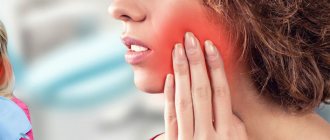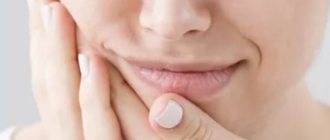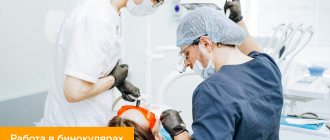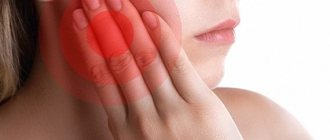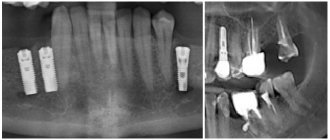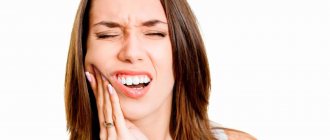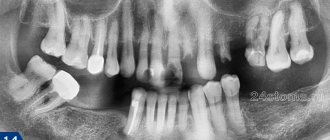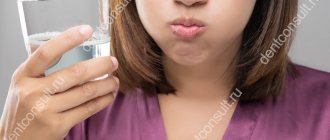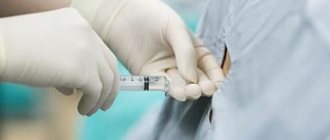Author of the article:
Soldatova Lyudmila Nikolaevna
Candidate of Medical Sciences, Professor of the Department of Clinical Dentistry of the St. Petersburg Medical and Social Institute, Chief Physician of the Alfa-Dent Dental Clinic, St. Petersburg
Many of you are probably familiar with this unpleasant state: as soon as you bite off a piece of chocolate or take the first sip of aromatic coffee, your teeth begin to “ache.” And let's be honest, "breaking" is an understatement. The jaw literally cramps with pain, and the skin instantly breaks out in goosebumps.
We’ll talk today about why the jaw suddenly begins to “ache” and the teeth begin to ache, and most importantly, how to get rid of such manifestations in the present and prevent them in the future.
How can discomfort manifest itself?
In the language of dentists, this phenomenon is called hypersensitivity or hyperesthesia. And the main causes of discomfort are abrasion and cracks of the enamel.
Pain from so-called aching teeth can manifest itself in different ways. Some patients have pain in all rows at the same time, and in some patients only 2-3 teeth hurt. The following manifestations are characteristic of hyperesthesia:
- Sharp aching pain of uncertain localization. A person complains that “the whole jaw begins to ache at once.”
- Severe pain when eating sweet/hot/cold foods and drinks.
- Pain localized to a specific part, such as the front teeth or back molars.
Dentists classify enamel hypersensitivity in different ways - according to the degree of prevalence, stage of occurrence and origin.
According to the degree of prevalence, hyperesthesia is divided into two types:
- Localized.
Occurs in the area of one or more teeth. This type of aches is caused by carious cavities and wedge-shaped defects in the necks of teeth. Sensitivity can also be caused by grinding down the enamel to install crowns. - Generalized.
This sensitivity spreads throughout the entire jaw. Hyperesthesia is provoked by periodontal tissue diseases, blooming caries and enamel erosion.
According to the causes of occurrence, hyperesthesia can be classified as follows:
- Hypersensitivity due to dental damage - caries, grinding and erosion of enamel.
- Hypersensitivity due to exposure of necks, tooth roots, as well as systemic pathologies in the body.
They are divided according to the stage of occurrence:
- 1st degree. Teeth ache due to temperature changes; the electrical excitability of dentin does not exceed 8 microamps.
- 2nd degree. Dentin begins to react not only to temperature, but also to chemical stimuli. Maximum electrical excitability is 5 microamps.
- 3rd degree. The teeth begin to cramp under any irritant, electrical excitability increases to 3 microamps.
Bruxism or teeth grinding - its causes and consequences, how it can be cured
Due to stressful situations, people often clench their teeth tightly, causing the chewing muscles to become hypertonic.
Overstrain of the facial muscles can cause frequent headaches and chronic fatigue - these symptoms are familiar to many. They are the secondary signs of bruxism.
- Bruxism is the grinding of teeth during sleep, which occurs due to hypertonicity of the masticatory muscles.
Bruxism causes excessive wear of teeth and overloads the gums, which are what hold the teeth in the bone.
The cause of night grinding of teeth is not only stress and nervousness, but also an incorrect bite, which is corrected by an orthodontist.
- In order for the bite to form correctly, you need to visit an orthodontist from early childhood to correct defects. In childhood, bite correction occurs faster and easier than in adults.
But adults with malocclusion should not despair either. Yes, to achieve excellent results, you will have to spend more time and effort, but a beautiful smile and health are worth it.
- People suffering from bruxism may also need the help of a dentist to restore worn-out tooth surfaces and eliminate cracks and chips.
Teeth can be restored using crowns, implants or fillings made of polymer materials. Our specialists are always ready to advise you on the optimal solution.
Causes of toothache
As we have already said, the main reason for such painful sensations is the thinning of the enamel. Hyperesthesia can also develop due to:
- dentin reactions;
- allergies to dental medications;
- periodontal diseases;
- mechanical damage to enamel;
- hereditary predisposition.
Let's look at each cause of the problem in more detail.
How might the nerve react?
Often teeth due to deep caries and pulpitis. And such “ache” will very soon turn into more serious, excruciating pain, not only when cleaning and eating hot or cold food, but also in a calm state, both day and night.
With pulpitis, a cavity develops in the coronal part and root canals of the teeth, where the nerve fibers are located, which over time fills with pus and blood. And although the epicenter of inflammation in this case is the nerve, the patient may initially complain that the whole row of teeth is “aching.” The sensations are localized in one tooth a little later, the pain becomes unbearable and requires the intervention of a dentist.
What's happening
In a systematic review, researchers report that 20-40% of coronavirus patients experience psychiatric disorders:
- insomnia - in 42% of patients
- impaired attention and concentration - in 38%
- anxiety - 36%
- memory impairment - 34%
- depression - 33%
- impaired consciousness - in 21%
- post-traumatic stress disorder - in 4-7%
Every fourth patient experiences severe headache and dizziness, 69% have psychomotor agitation, and 0.7% have seizures and movement disorders. Elderly people may develop delirium, a disorder of consciousness in which thinking, attention, and perception of the world around them are impaired. However, delirium most often occurs in older patients with dementia, a syndrome of cognitive decline. Sometimes this is their only symptom of coronavirus without any disturbances in the respiratory system.
“People with coronavirus infection often experience negative psychological reactions: an acute reaction to stress, depression, emotional disturbances, obsessions and dysphoria - a combination of gloomy mood and irritability,” says Olga Markina, candidate of psychological sciences, SberHealth consultant.”
A large-scale outbreak of coronavirus is not the first time in history. During previous epidemics, doctors observed depressed mood and anxiety in patients - the most common symptoms in the acute phase of intoxication that accompanies the disease. A small proportion of patients experience psychosis - an acute disorder of mental activity in which mental processes are desynchronized, the perception of the real world is disrupted, and behavior and emotional reactions do not correspond to the real situation.
“During illness, patients experience fear and anxiety,” neurologist and rehabilitation specialist at GMS Clinic Tigran Makichyan shares his experience. “This is due to many factors: media pressure, stories that someone you know has died, a rapid heartbeat that makes a person restless and anxious.”
Some patients also experience catatonia, a movement disorder accompanied by either complete stupor or increased agitation.
“Work experience shows that coronavirus infection, associated with intoxication and oxygen deprivation of the brain, can cause exacerbation of diseases of the neurological and psychiatric spectrum,” warns Olga Markina. — In older patients, emotional and intellectual impairment may worsen. COVID-19 can also cause a psychotic state: confusion, hallucinations and delusions. Episodes of anxiety-depressive disorder, panic attacks and obsessive-compulsive disorder occur quite often.”
If a person with a mental disorder is sick with coronavirus, then the infection and its treatment can trigger a relapse and worsen the course of the disorder. For example, medications for the treatment of COVID-19 can provoke psychosis in a patient with schizophrenia - delusions, hallucinations and inappropriate behavior, for example, the patient will think that medical staff are trying to infect him.
“Coronavirus leads to decompensation of all chronic diseases, including schizophrenia,” says Tigran Makichyan. “Against the background of hypoxia, when the brain does not have enough oxygen, patients become disoriented, but after recovery, as a rule, this goes away.”
Mental disorders are caused not only by the direct impact of infection on the brain, but by socio-psychological and economic factors associated with coronavirus. People associate a pandemic with instability and unpredictability. Quarantine, social restrictions, uninterrupted news flow about morbidity and mortality from COVID - all this affects the emotional state and mood of people. Thus, depression, anxiety, sleep disturbances, feelings of loneliness, depression and apathy can be caused by:
- high frequency of contact with infected people
- fear of infecting loved ones
- the need for physical distancing and wearing masks
- feeling of medical and social insecurity
- regular media reports about coronavirus
- lack of information about when the pandemic will end
A Chinese study demonstrates that the very fact of an outbreak of a virus pandemic is already affecting the mental state of people who have not contracted the coronavirus. Thus, approximately one in six, under the influence of the epidemic, developed symptoms of moderate and severe depression, and one in three developed signs of an anxiety disorder of moderate or severe severity.
In addition, some respondents reported symptoms of post-traumatic stress disorder and psychological distress. There are also reports that the pandemic is worsening mental health disorders in people who do not have coronavirus.
Covid affects not only the patient himself. It is reported that 50% of family members with a coronavirus patient experience symptoms of depression.
Thinning enamel
Tooth enamel can become thinner for a variety of reasons, such as:
- improper bleaching or poor-quality professional cleaning;
- using brushes that are too hard;
- using pastes with abrasives that expose the enamel to chemical and mechanical stress;
- vitamin deficiency (the pain in this case is characterized by an aching, twitching character and manifests itself during cleaning, rinsing the mouth, eating and drinking).
Dentin reaction
Dentin is the hard tissue of the tooth underneath the enamel. This is a layer that, after damage, can allow irritants to pass into the nerve zones. Dentin is destroyed during advanced stages of caries, and can also occur with inadequate dental treatment if an infection develops under a filling.
If teeth ache for this reason, the patient feels a drilling, sharp pain, similar to the sensations of purulent pulpitis.
In very rare cases, teeth ache due to the patient’s individual intolerance to certain dental medications, after visiting a doctor. In this case, the pain is accompanied by itching in the gums and palate.
The effect of stress on dental health
Unfortunately, in everyday life, everyone can be exposed to similar stressful situations. The consequences of this will be similar. It is necessary to identify defects as early as possible and begin to deal with them. If a dental examination is carried out in a timely manner with the resulting preventive measures, then the risk of illness in people in extreme professions can be reduced by 40-45 percent.
It is important to choose the right teams in which people will get along well.
How to relieve pain?
If aches and pain in your teeth caught you in the middle of the night, and you only made an appointment with the doctor the day after tomorrow, try to relieve the painful sensations for a while. Here are some popular and effective ways to temporarily soothe aching teeth.
- Acupressure
will help relieve discomfort for a couple of hours. Try massaging the grooves between the phalanges of the index and thumb, the base of the ears, and the area between the cheekbone and lower jaw. - Rinse
. For an anesthetic rinse, a decoction of chamomile, St. John's wort, lemon balm, mint or oregano is suitable. Just pour 1-2 tablespoons of the dry plant with a glass of boiling water, and then keep the composition in a water bath for 20 minutes. If there are no medicinal herbs in your home medicine cabinet, rinse your mouth with a salt solution. Dissolve a teaspoon of the substance in a glass of water and begin therapy. - Painkillers
will help you rest before your visit to the doctor and relieve aching teeth. Dentists advise choosing new painkillers with each new attack of pain - Nurofen, Analgin, Ketanov, paracetamol, aspirin. However, do not under any circumstances overdo it with pills! Firstly, these drugs are addictive, and secondly, they have a bad effect on the liver, kidneys, gastrointestinal tract and other systems in the body. - Clove, mint and sea buckthorn oils
will help relieve pain and even relieve swelling of the gums. For pain relief, it is enough to soak cotton swabs and cover the sore teeth. Tampons should be changed every 2 hours. - Propolis
is an excellent natural anesthetic, similar in action to novocaine. To pacify dental aches and pain, you can wipe the gums with an alcohol solution of propolis or moisten cotton wool with it and cover the sore tooth. Some dentists advise using propolis in plates: you can simply cover the hole with a piece of the substance or put propolis on the gum near the tooth. The product is prohibited for patients who suffer from allergies to honey and other bee products. - Garlic,
according to patient reviews, helps to forget about the painful aches for a couple of hours. You can use a cut or ground clove, applying it to a sore tooth, or chew garlic with black bread and hold it in your mouth. This vegetable warms the skin, so it can be used as an irritant for acupuncture points. To soothe a toothache, a paste of two cloves of garlic should be applied to the inside of the wrist on your hand (the opposite side on which the tooth hurts). The medicine is fixed on the skin with a bandage and lasts for several hours. - radishes
have been used to treat toothache and gum inflammation. To prepare a natural analgesic, you need to wash the vegetable, peel it from the skin and grate it on a fine grater, and then pour 2 tablespoons of the pulp with 0.5 liters of boiling water. To relieve pain with the composition, you need to rinse your mouth every hour. - Plantain root
is an excellent summer analgesic. Simply rinse it and apply it to the sore tooth. After 20-30 minutes the pain will go away.
For toothache of infectious origin, Asepta Active mouth rinse is an effective analgesic, antibacterial and anti-inflammatory agent. This product combines a combination of benzydamine and chlorhexidine, which not only has a pronounced antibacterial effect, but also prevents inflammation and bleeding of the gums, freshens breath and prevents the formation of plaque.
“Endure by gritting your teeth: HOW STRESS AFFECTS YOUR TEETH”
Psychologists say that anger and malice live in the lower jaw. Tension in the dental system, in their opinion, is primarily associated with experiences. The aphorism “endure with clenched teeth” is proof of this. Dentists not only agree with the thesis, they went further and proved the relationship between stress and posture, devoting many scientific studies and dissertations to their guess. We will talk about medical signs by which it is easy to determine how firmly negative emotions have settled in the body, and about their detrimental effect on the human spine and skeleton .
“For all life on Earth, in a moment of danger, there are two ways - to run or fight,” says the specialist. – At this moment, any living creature will clench its teeth, this happens with the help of the large masticatory muscle (musculus masseter). It is she who causes the jaws to clench tightly. The more often a person is in stressful situations, the more angry he gets, the stronger this muscle develops, pumping up, like an athlete’s biceps. In common parlance, a similar process sounds like “rolling the nodules.” It is they who emphasize the cheekbones and angles of the jaw, which, on the one hand, speak of brutality and strength of personality, and on the other hand, reveal frequent manifestations of anger and anger.”
Constant stress provokes active physical growth of the musculus masseter, which contributes to the formation of a bone growth - a callus, in the place where the muscle and jaw connect. This leads to increased stress on the teeth, destroying them. The surface of the enamel – the upper shell of the tooth, under which there is a softer layer – dentin, is worn away. As soon as the enamel ceases to protect it, caries immediately develops in it and destroys the nerve. In addition, a malocclusion gradually develops when the lower jaw moves forward due to constant overexertion.
At this time, the most unexpected and seemingly incredible thing happens - the skeleton begins to change! According to the expert, the human temporomandibular joint is the center of balance of the entire body. “If the relative position of the jaws, that is, the bite, is correct, then the lower jaw in combination with the muscles is a counterweight to the entire body. If the correspondence of the jaws is disturbed, then the balance is also disturbed, because Not only the muscles supporting the lower jaw, but the entire body are tensed. Since it takes on additional load, this affects the spine - a violation of the skeletal symmetry occurs. Patients usually do not associate scoliosis with an imbalance in the position of the jaws. In this case, there is only one way to relieve muscle pain and eliminate skeletal changes: to bring the occlusion to a normal state,” says Dmitry Smirnov.
Medical research has been conducted on this topic and there is a lot of evidence of the relationship between bite and posture. Scientists and doctors have even proven the effect of malocclusion on the balance of the feet. A quite obvious process occurs in the bone structures: negative emotions - anger, rage, rage and patience - disrupt the correct position of the jaws, which, in turn, causes dysfunction of the joints of the cervical spine, and this already leads to deformation of the rest of it with all that it entails consequences. Muscle muscles react to outbursts of anger and aggression with spasms - the muscles “cramp” whenever we experience negative emotions. Constant spasm of the muscle fiber involves other muscles, which causes muscle deformation and body asymmetry.
In a word, in order not to suffer from ailments of the musculoskeletal system, back pain and incorrect posture, you should get rid of all negative emotions and stop being angry. A smile is the main weapon in the fight not only against constant stress and bad mood, but also a strong argument in favor of a healthy spine.
What is absolutely forbidden to do?
In order not to double the painful sensations of aching in the jaw, it is important to adhere to several rules before visiting a doctor:
- Regularly clean the oral cavity of food debris; sometimes it is particles from lunches and dinners that often become the cause of especially severe pain in pulpitis and periodontitis.
- Never chew on the side of the affected tooth.
- Heating a sore spot is strictly prohibited. Any hot compresses increase blood flow and increase pain.
- Try not to be in a lying position; this position activates blood circulation in the periodontal tissues and increases pressure on them.
We have listed the main ways to relieve toothache. However, these methods, with all their diversity, will not help cure the cause of the unpleasant manifestation and are only a temporary measure. As soon as you feel your teeth hurting, make an appointment with the dentist. Believe me, the sooner you start treatment, the faster and cheaper you will get rid of painful sensations.
What measures should be taken first?
First of all, it is necessary to treat all diseased teeth, remove tartar, poorly installed crowns or dentures. Smokers will have to quit smoking or reduce the number of cigarettes to a minimum. If there is no improvement, you need to make a scraping in order to determine the type of causative agent of the disease: staphylococcus, streptococcus or yeast, and conduct a laboratory blood test to determine the content of vitamin B2.
If a fungus is detected, nystatin or levorin, as well as other antifungal drugs, are prescribed. Lubricate problem areas with 1% erythromycin ointment or 5% mercury ointment. Oxycor and a 10% glycerin solution of borax are also used. However, you should not self-medicate.
The doctor will select the medications that are ideal for the patient, taking into account the characteristics of the disease and attitude to medications. To improve the patient's condition, you can use an infusion of oak bark or alder cones; these infusions are good at disinfecting inflamed areas.
Vitamins, rosehip orphans, and medicinal brewer's yeast should be taken orally. Include more vegetables and fruits in your food, limit the consumption of salty, sour, and spicy foods as much as possible. Consume more dairy products and eat boiled meat. The amount of sweets should be reduced to a minimum. To avoid recurrence of jamming and the negative impact of stress on the condition of teeth , you should follow the rules of personal hygiene.
Stress and teeth, jams, causes and treatment of jams
Clinical researches
Repeated clinical studies have proven that the two-component mouth rinse ASEPTA ACTIVE more effectively combats the causes of inflammation and bleeding compared to single-component rinses - it reduces inflammation by 41% and reduces bleeding gums by 43%.
Sources:
- The effectiveness of the use of Asept “adhesive balm” and Asept “gel with propolis” in the treatment of chronic generalized periodontitis and gingivitis in the acute stage (Municipal Dental Clinic No. 4, Bryansk, Kaminskaya T. M. Head of the therapeutic department Kaminskaya Tatyana Mikhailovna MUZ City Dental Clinic No. 4, Bryansk
- Study of the clinical effectiveness of treatment and prophylactic agents of the Asepta line in the treatment of inflammatory periodontal diseases (A.I. Grudyanov, I.Yu. Aleksandrovskaya, V.Yu. Korzunina) A.I. GRUDYANOV, Doctor of Medical Sciences, Prof., Head of Department I.Yu. ALEXANDROVSKAYA, Ph.D. V.Yu. KORZUNINA, asp. Department of Periodontology, Central Research Institute of Dentistry and Maxillofacial Surgery, Rosmedtekhnologii, Moscow
- The role of anti-inflammatory rinse in the treatment of periodontal diseases (L.Yu. Orekhova, A.A. Leontyev, S.B. Ulitovsky) L.Yu. OREKHOVA, Doctor of Medical Sciences, Prof., Head of Department; A.A. LEONTIEV, dentist; S.B. ULITOVSKY, Doctor of Medical Sciences, Prof. Department of Therapeutic Dentistry of St. Petersburg State Medical University named after. acad. I. P. Pavlova
- Report on the determination/confirmation of the preventive properties of personal oral hygiene products “ASEPTA PLUS” Remineralization doctor-researcher A.A. Leontyev, head Department of Preventive Dentistry, Doctor of Medical Sciences, Professor S.B. Ulitovsky First St. Petersburg State Medical University named after. acad. I.P. Pavlova, Department of Preventive Dentistry
